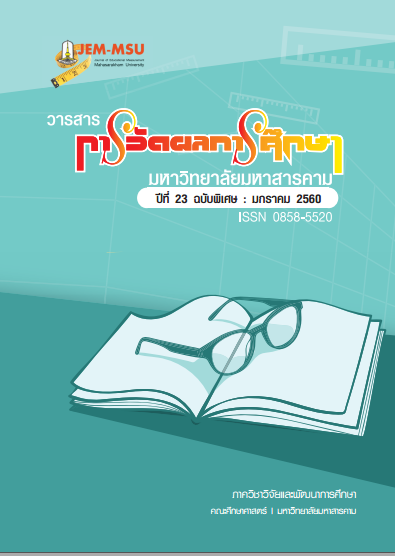Developing Critical Thinking Indicators for Primary School Teachers
Main Article Content
Abstract
This research aimed: 1) to examine factors and indicators of critical thinking for
primary school teachers. The examination was conducted by analyzing and synthesizing
factors and indicators through documents and related research. The appropriated of
factors and indicators was verify by experts. Exploratory data was collected from the
sample of 500 primary school teachers in northeast of Thailand for analyzing confirmatory
factors and indicators; and 2) to investigate guidelines for developing critical thinking of
primary school teachers using in-depth interview and evaluated by experts for appropriateness
and feasibility. The findings showed that there were the following 2 main factors, 9 subfactors, and 38 indicators. Main factors consisted of 1) critical thinking abilities; comprising 4
sub-factors: elementary clarification, advanced clarification, judging information, and
inference; and 2) 5 dispositions, comprising open mindedness, analyst, truth seeking,
cognitive maturity, and self confidence. The results of analyzing factors and indicators using
confirmatory factor analysis revealed that these factors and indicators of critical thinking for
primary school teachers confirmed well with empirical data, with 2= 18.940, df=16, P-Value
= .272, RMSEA = .019, GFI = .992, AGFI = .977, NFI = .979, CFI = .997. Additionally, the
approach of guidelines for developing critical thinking of primary school teachers consisted
of: 1) encouraging awareness and inspiration, 2) providing critical thinking knowledge, 3)
implementing critical thinking approach in learning management, 4) monitoring and
evaluation.
Article Details
The content and information contained in the published article in the Journal of Educational Measurement Mahasarakham University represent the opinions and responsibilities of the authors directly. The editorial board of the journal is not necessarily in agreement with or responsible for any of the content.
The articles, data, content, images, etc. that have been published in the Journal of Educational Measurement Mahasarakham University are copyrighted by the journal. If any individual or organization wishes to reproduce or perform any actions involving the entirety or any part of the content, they must obtain written permission from the Journal of Educational Measurement Mahasarakham University.


